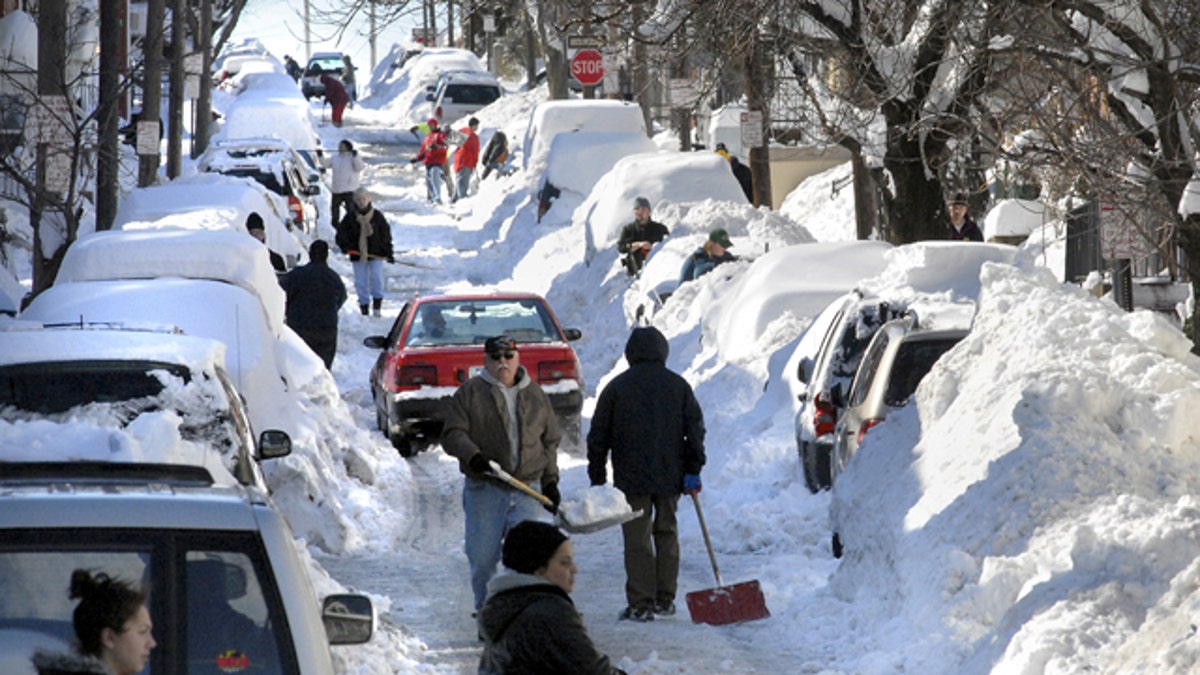
As snow-weary Pennsylvanians dug out, utilities struggled to restore power to thousands and crews worked to reopen closed roads after a record-breaking blizzard that dumped more than a foot of snow across the state. (AP Photo/Intelligencer Journal, Richard Hertzler)
Scientists and politicians on both sides of the climate change debate have been pointing to the record-breaking snowstorms in the Mid-Atlantic states to promote their theories on the earth's changing temperatures -- and the debate is getting downright nasty.
Joseph Romm, a climate change expert and former Energy Department official; Jeff Masters, a meteorologist who writes on the Weather Underground blog; and others argue that this winter's snowstorms are, counterintuitively, evidence of global warming and not cooling.
"It's absurd for the 'anti-science side' to say we're in a cooling trend when we're in an overall warming trend," says Romm of the Center for American Progress, a liberal think tank. "Heavy snow is not evidence that climate science is false," he added, noting that "the snow we've seen is entirely consistent with global warming theory."
But Patrick J. Michaels, senior fellow in environmental studies at the Cato Institute and state climatologist for Virginia for 27 years, disagrees. "Global warming simply hasn't done a darned thing to Washington's snow," he wrote on National Review, adding that "if you plot out year-to-year snow around here, you'll see no trend whatsoever through the entire history."
Politicians are jumping on the bandwagon, too. "It's going to keep snowing in DC until Al Gore cries 'uncle,'" tweeted Sen. Jim DeMint, R-S.C.
Global warming advocates feel under attack as skeptics use the record-setting snowstorms -- and the recent discoveries of errors in the U.N.'s climate science study, a growing scandal called climate-gate -- to question the theory that climate change is a manmade problem.
Romm explains that cold weather doesn't cause snow. What brings the flakes down is a combination of cold and precipitation. And since warmer air holds more moisture, global warming and heavy snowfall can coexist, so long as temperatures keeping dipping below 32 degrees.
Bill Nye, the Science Guy, agrees, going so far as to tell MSNBC's Rachel Maddow that scientists who doubt climate change's manmade origins are unpatriotic. "If you want to get serious about it, these guys claiming that the snow in Washington disproves climate change are almost unpatriotic -- it's as if they're denying science," Nye said.
And though the science debate heats up, unlike the weather, the snowstorms have set off even more questions: Why is the East Coast getting hit, while Vancouver needs to truck in snow for the Winter Olympics? Can we accurately link extreme weather with global warming?
Not really, says meteorologist Jeff Masters of Weather Underground, an independent forecaster. "You can't take regional events and link them to overall climate change," he said. "There's a huge amount of natural variance."
But some skeptics say the science isn't that innocent, even though they acknowledge global warming as a measurable anomaly. "As climate change critics, we're not denying an increase in temperature," says Dan Miller, publisher of the Heartland Institute, a group that favors free-market solutions to public policy problems. "We're skeptical of the crisis level and the cause."
Miller says climate-change scientists have a conflict of interest, as many stand to receive "a huge amount of money" from the government to support continued research. "There is no upper limit of money at stake," he warns.
Conversely, Miller says his firm is impartial, having no financial investment in climate change; it would lose a mere 4 percent of its funding if it ends up on the wrong side of the debate. "There's no money at stake for critics," he points out.
Masters says in a perfect world he'd need "200-300 years worth of records" to accurately predict further climate change. But since that's not available, "We're forced to make decisions on a limited data set." Nevertheless, Masters feels the possible dangers of global warming outweigh the risks of remaining idle. "We need to take action even in the face of inadequate data," he says.
Miller disagrees, arguing that we should collectively return to the drawing board -- in light of all the controversy, confusion, and potential conflicts of interest -- before we draw any conclusions.
"The science isn't settled," he says. "Yes, the climate has warmed -- that's not a hoax. But can't we go back and reconsider the science? Let's just step back and reconsider."




















